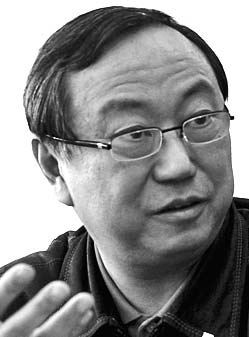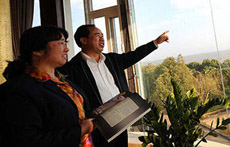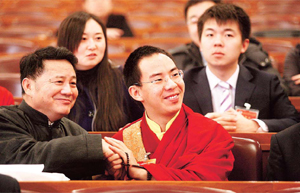More trade complaints urged
By Ding Qingfen (China Daily)
Updated: 2010-03-12 07:15
BEIJING - China has long been the target of other nations' accusations of unfair trade practices, but now it's time for China to turn the tables and initiate more trade complaints against other nations, a top trade promoter has urged.
The country should leverage the WTO (World Trade Organization) rules to fight back against a growing number of such cases against Chinese imports worldwide, said Wan Jifei, chairman of the China Council for the Promotion of International Trade.
Wan also pointed out the upward trend on trade protectionism against China will be "sustained" for "quite a long period".
The Chinese government should consider measures to "import more" and "to encourage more Chinese enterprises to go overseas", in a bid to soften the hostile stand from other countries, especially the United States and the European Union, on the surge of imports amid the financial crisis, said Wan, who is also a member of the Chinese People's Political Consultative Conference National Committee.
In 2009, China was challenged by 116 trade remedy cases worth $12.7 billion. "China will have to face more fierce trade conflicts with its major trading partners this year and this situation will continue for long time, given the nation's strengthened power in the global trade and cooperation," Wan told China Daily.
In 2009, China exceeded Germany and became the world's top exporter, the first time since 2003. Most economists say that China continues to lead in global exports due to cheap, quality commodities.
|
 |
|
Wan Jifei FENG YONGBIN/CHINA DAILY |
"Since the growing trade remedy cases are unavoidable, China should shift to consider more about how to create more benefits for its own industries under the WTO framework, lodging more appeals to the imports from foreign countries," Wan said.
Since China's entry into the WTO in 2001, China has been an "outsider of the rules and regulations," Wan said. China has only lodged four complaints against its trade partners since then, which compares with 60 cases against China annually. The four target the US and EU.
The first happened when China launched anti-dumping probes into imports of fasteners from the EU. A few days after US President Barack Obama agreed to the tire case against Chinese exporters last September, China announced the launch of an anti-dumping and anti-subsidy investigation into imports of broiled chicken from the US, and in November it initiated a probe into off-road vehicles and sedans from the US.
"China is a quick-learner. During the first few years since its entry into the WTO, the nation kept quiet and prudent, but it is becoming more aggressive during the past year," said Fu Donghui, managing partner of Allbright Law Firm, which deals with trade dispute cases concerning China.
More exports, overseas investment
"More imports and overseas investment would be a most efficient way to ease off trade conflicts," said Wan.
Trade deficit with China has been providing ammunition for westerners to launch trade remedy cases and demands for currency revaluation. As a stimulus package on boosting domestic consumption takes off, China's imports, which witnessed growth for three consecutive months since last November, continued to surge.
During his annual work report made last Friday, Premier Wen Jiabao said China will simplify procedures on approving overseas direct investment (ODI), granting the enterprises more self-decision power.
"It's a signal that China's ODI will boom this year, as China vows to loosen restrictions," said Zhang Xiaoji, senior researcher at the Development Research Center of the State Council.
China's ODI recorded growth of 6.5 percent to $43.3 billion in 2009, but economists said it could surge higher if there were fewer government restrictions.
Market economy status has frequently sparked accusations of trade protectionism. "As Chinese enterprises have more establishment in nations whose market economy status is widely recognized, the conflicts will naturally weaken," said Fu.


